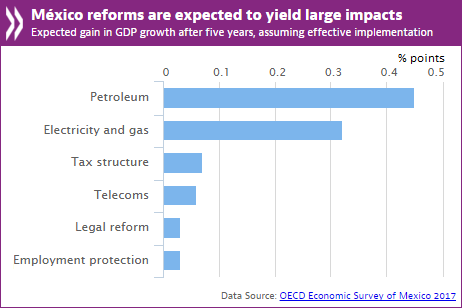Mexico: Reforms are starting to bear fruit, but further action is needed to boost productivity and ensure more inclusive growth, OECD says
Ambitious structural reforms and sound macroeconomic policies have strengthened the resilience of the Mexican economy despite a complex national scenario and challenging global conditions, but more can be done to boost productivity and ensure that growth is inclusive enough to achieve better living conditions for all, according to a new report from the OECD.

The latest OECD Economic Survey of Mexico recognises that the Mexican economy is facing strong external headwinds - including lower oil prices, weak world trade, the depreciation of the peso following expectations of monetary policy tightening in the United States and uncertainty linked to the forthcoming change of US Administration – that will hold back growth over the 2017-18 period.
The Survey, presented in Mexico City by OECD Secretary-General Angel Gurría and Mexico’s Minister of Finance José Antonio Meade, suggests that the country can ensure more growth and more inclusion by re-prioritising its public spending towards infrastructure, training, health and poverty reduction while pushing ahead with reforms in a range of areas. It also makes a strong call for gender-based policies to better integrate women in the labour market and take advantage of their skills.
“The reforms undertaken in Mexico are working, with positive effects particularly in the prices and access in the telecommunications area,” Mr Gurría said. “Productivity is increasing in some sectors but there is still much more to be done for the economy to become more resilient. This will require that Mexico continues to implement the reforms that have been approved, particularly on education, tackling the high level of informality, and gender inequality, to ensure that all Mexicans have the skills and opportunity to succeed,” Mr Gurría said.
The Survey highlights the increasing disparities between the highly-productive modern economy in the northern and central regions of Mexico and the lower-productivity traditional economy in the south. It lays out a series of new recommendations for maintaining economic resilience, raising productivity and fostering inclusiveness.
Making fiscal policy more supportive of inclusive growth, notably through more and better social spending, should be a priority. Reducing inequalities, via policies to better fight poverty, promote women’s opportunities and foster responsible business practices, is also essential, the Survey said.
To ensure more inclusive productivity growth, Mexico should move forward with reforms to key sectors of the economy, seek to maintain and improve its place in global value chains, lower regulatory barriers, tackle informality and insecurity, and reduce corruption through reforms to governance and legal procedures, the Survey said.
“Our latest Survey shows that Mexico should make productivity and inclusivity the focus of the government and the different stakeholders,” Mr Gurría said. “Given the wide range of political and economic challenges facing Mexico, this course of action is more important than ever.”
Other OECD reports on Mexico to be released this week during the visit of Secretary-General Gurría look at skills, governance, tourism and how public procurement at Pemex is adapting to the opening of the oil sector to competition.
The OECD Skills Strategy Diagnostic Report, provides a strategic assessment of the national skills system in Mexico, assesses how skills are developed, activated and used, and will contribute to the design of effective policies and strategies to meet Mexico’s future skill needs.
The Public Procurement Review of Mexioc's PEMEX: Adapting to Change in the Oil Industry will be available from 18h CET/11h Mexico on Wednesday 11 January (in Spanish). The Review finds that more can be done to professionalise procurement procedures at Pemex and introduce more competitive tenders.
The OECD Integrity Review of Mexico: Taking a stronger stance against corruption will be available from 01h CET Thursday 12 January/18h Mexico on Wednesday 11 January (in Spanish). It examines Mexico’s recent anti-corruption reforms and recommends the strengthening of enforcement and accountability mechanisms and the integration of anti-corruption policies into areas such as open government, education and security to improve competitiveness, productivity and trust in government.
The Tourism Policy Review of Mexico, which finds that there is significant untapped potential to create inclusive growth in Mexico through new tourism models focused on local development, will be available from 19h CET/12h Mexico on Thursday 12 January.
Source: Organization for Economic Co-operation and Development
- 269 reads
Human Rights
Fostering a More Humane World: The 28th Eurasian Economic Summi

Conscience, Hope, and Action: Keys to Global Peace and Sustainability

Ringing FOWPAL’s Peace Bell for the World:Nobel Peace Prize Laureates’ Visions and Actions

Protecting the World’s Cultural Diversity for a Sustainable Future

Puppet Show I International Friendship Day 2020

